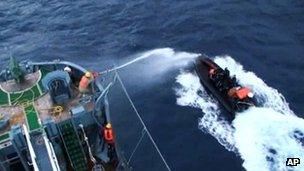Japan whalers given Sea Shepherd injunction by US court
- Published

There have been numerous clashes between the whalers and Sea Shepherd vessels in the past
A US court has ordered conservation group Sea Shepherd to stay at least 500 yards away from Japan's whaling fleet in the Southern Ocean.
The US Court of Appeals for the Ninth Circuit banned the group from "physically attacking any vessel engaged by the plaintiffs".
The court was responding to an appeal by Japan's whalers, after an earlier case was rejected.
The injunction remains in force until the court formally rules on the appeal.
The ruling by the court, external also bans Sea Shepherd from "navigating in a manner that is likely to endanger the safe navigation" of any whaling vessel.
Whaling clashes
Every year, vessels from the US-based Sea Shepherd follow the Japanese whaling fleet south to try and disrupt its activities.
Numerous collisions, clashes and boardings have occurred in the past, with each side blaming the other for aggressive tactics.
The group was founded by Paul Watson, who is wanted by Interpol after skipping bail in Germany. He is accused of endangering the crew of a Costa Rican ship that was fishing for sharks in 2002.
He is currently on a Sea Shepherd vessel preparing to pursue the Japanese fleet.
Japan's fleet sails to the Antarctic in the autumn or winter each year, returning the following spring.
There has been a ban on commercial whaling for 25 years, but Japan catches about 1,000 whales each year in what it says is a scientific research programme.
Critics say it is commercial whaling in another guise. Australia and New Zealand are pursuing a legal case against Japan in international courts.
Last year Japan cut short its whaling season - a move attributed to the harassment by Sea Shepherd.
Japan's Institute of Cetacean Research, which oversees whaling, welcome the court's move, external.
But Sea Shepherd vowed to continue its activities, questioning the legality of the ruling.
"It is a complex situation whereby a United States court is issuing an injunction against Dutch and Australian vessels carrying an international crew, operating out of Australia and New Zealand in international waters," it said in a statement on its website, external.
- Published26 July 2012
- Published14 May 2012
- Published18 January 2012
- Published10 January 2012
- Published29 December 2011
- Published5 October 2011